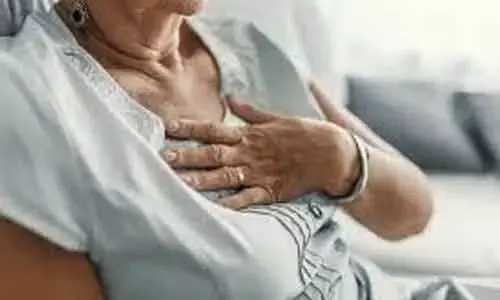- Home
- Medical news & Guidelines
- Anesthesiology
- Cardiology and CTVS
- Critical Care
- Dentistry
- Dermatology
- Diabetes and Endocrinology
- ENT
- Gastroenterology
- Medicine
- Nephrology
- Neurology
- Obstretics-Gynaecology
- Oncology
- Ophthalmology
- Orthopaedics
- Pediatrics-Neonatology
- Psychiatry
- Pulmonology
- Radiology
- Surgery
- Urology
- Laboratory Medicine
- Diet
- Nursing
- Paramedical
- Physiotherapy
- Health news
- Fact Check
- Bone Health Fact Check
- Brain Health Fact Check
- Cancer Related Fact Check
- Child Care Fact Check
- Dental and oral health fact check
- Diabetes and metabolic health fact check
- Diet and Nutrition Fact Check
- Eye and ENT Care Fact Check
- Fitness fact check
- Gut health fact check
- Heart health fact check
- Kidney health fact check
- Medical education fact check
- Men's health fact check
- Respiratory fact check
- Skin and hair care fact check
- Vaccine and Immunization fact check
- Women's health fact check
- AYUSH
- State News
- Andaman and Nicobar Islands
- Andhra Pradesh
- Arunachal Pradesh
- Assam
- Bihar
- Chandigarh
- Chattisgarh
- Dadra and Nagar Haveli
- Daman and Diu
- Delhi
- Goa
- Gujarat
- Haryana
- Himachal Pradesh
- Jammu & Kashmir
- Jharkhand
- Karnataka
- Kerala
- Ladakh
- Lakshadweep
- Madhya Pradesh
- Maharashtra
- Manipur
- Meghalaya
- Mizoram
- Nagaland
- Odisha
- Puducherry
- Punjab
- Rajasthan
- Sikkim
- Tamil Nadu
- Telangana
- Tripura
- Uttar Pradesh
- Uttrakhand
- West Bengal
- Medical Education
- Industry
Conjugated equine estrogens protect against heart disease in postmenopausal women

CLEVELAND -New study based on KEEPS data suggests that oral conjugated equine estrogens slow down adverse effects of heart fat deposition leading to atherosclerosis.
During menopause women not only are likely to accumulate more abdominal visceral fat, but fat deposition around the heart also increases. This has been linked to atherosclerosis progression, which also increases between perimenopause and postmenopause. Hormone therapy has proven to slow down heart fat deposition and the progression of atherosclerosis, depending on the type of hormone therapy and route of administration.
A new study compared the effects of conjugated equine estrogens (CEE) and 17β-estradiol and contrasted oral and transdermal delivery to determine their effectiveness in preventing heart disease. Study results are published online in Menopause, the journal of The North American Menopause Society (NAMS).
A new study evaluated recently menopausal women who participated in the Kronos Early Estrogen Prevention Study (KEEPS) trial. Its purpose was to evaluate how various forms of estrogen, specifically oral CEE and transdermal 17β-estradiol, affected heart fat accumulation and atherosclerosis progression as measured by the thickness of the lining of the carotid arteries.
According to study results, when compared with transdermal estradiol, oral CEE appears to slow down the adverse effects of increasing paracardial adipose tissue on the progression of atherosclerosis. The researchers concluded that more study is required to confirm whether these results are specific to oral CEE or to the oral route of administration.
Study results appear in the article "Atherosclerosis progression in recently menopausal women: impact of menopausal hormone therapy: The KEEPS trial."
"This study shows a distinct effect of hormone therapy on the link between heart fat deposits and atherosclerosis progression, based on the type of estrogen or the route of administration used. Additional research is needed to allow clinicians to individualize hormone therapy prescribing to optimize benefit and minimize risk," says Dr Stephanie Faubion, NAMS medical director.
For Further References log on to this link - https://www.menopause.org/docs/default-source/press-release/effects-of-different-hormone-therapies-on-heart-disease-2-5-20.pdf
Medical Dialogues Bureau consists of a team of passionate medical/scientific writers, led by doctors and healthcare researchers. Our team efforts to bring you updated and timely news about the important happenings of the medical and healthcare sector. Our editorial team can be reached at editorial@medicaldialogues.in.


